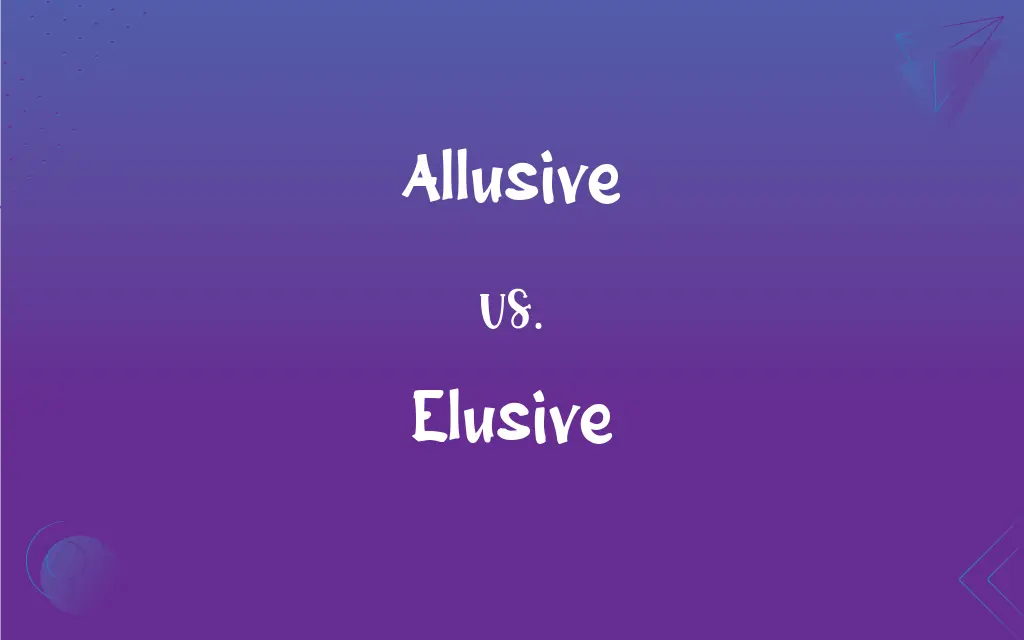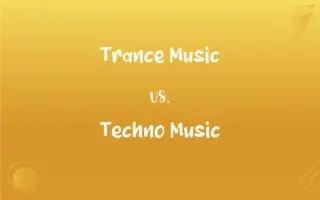Allusive vs. Elusive: What's the Difference?
Edited by Aimie Carlson || By Harlon Moss || Published on February 28, 2024
Allusive refers to indirect references or hints, while elusive describes something difficult to find, catch, or achieve.

Key Differences
Allusive is an adjective describing speech or writing that hints or indirectly refers to something. Elusive, on the other hand, characterizes something that is hard to grasp, define, or remember.
In literature, an allusive style incorporates subtle references or nods to other works. Elusive qualities in a character or plot make them challenging to understand or predict.
An allusive remark suggests or implies without being explicit, often requiring knowledge to decode. Conversely, elusive information or details are those that evade comprehension or capture.
Allusive content is rich with indirect references and often demands interpretative skills. Elusive, however, denotes the evasive nature of understanding, grasp, or achievement.
Allusive language is common in poetry and literature, where it enriches text through indirect references. Elusive concepts are prevalent in discussions of abstract or complex subjects, where clarity and definition are challenging.
ADVERTISEMENT
Comparison Chart
Meaning
Indirect or hinting
Hard to catch or define
Use in Language
Refers to suggestive speech or writing
Describes something that escapes understanding
Common Contexts
Literature, art, and poetry
Abstract concepts, elusive goals
Nature
Suggestive and referential
Evasive and hard to grasp
Requirement for Understanding
Knowledge of the references
Persistence and keen observation
ADVERTISEMENT
Allusive and Elusive Definitions
Allusive
Allusive indicates indirect references or hints.
His speech was allusive, full of references to Shakespeare.
Elusive
Elusive means difficult to find or catch.
The elusive criminal was finally caught by the police.
Allusive
Allusive implies a hinting or suggestive mode of expression.
Her poetry is allusive, requiring knowledge of Greek mythology.
Elusive
Elusive characterizes something that escapes comprehension.
The concept of time is often elusive in physics.
Allusive
Allusive describes a style that subtly suggests.
The novel's allusive nature made it a treasure trove for literary enthusiasts.
Elusive
Elusive describes something that evades grasp or achievement.
For many, happiness is an elusive goal.
Allusive
Allusive means full of allusions or indirect references.
The dialogue in the play was richly allusive, hinting at historical events.
Elusive
Elusive refers to something hard to remember or define.
The exact wording of the quote proved elusive.
Allusive
Allusive encompasses a way of hinting at things rather than stating them outright.
His writing is allusive, never explicitly stating its themes.
Elusive
Elusive implies a quality of evading clear understanding.
The meaning of the poem was elusive and open to interpretation.
Allusive
Containing or characterized by indirect references
An allusive speech.
Elusive
Tending to elude capture, perception, comprehension, or memory
"an invisible cabal of conspirators, each more elusive than the archterrorist [himself]" (David Kline).
Allusive
That contains or makes use of allusions (indirect references or hints)
Elusive
Difficult to define or describe
"Failures are more finely etched in our minds than triumphs, and success is an elusive, if not mythic, goal in our demanding society" (Hugh Drummond).
Allusive
Figurative; symbolical.
Allusive
Having reference to something not fully expressed; containing an allusion.
Allusive
Characterized by indirect references;
Allusive speech is characterized by allusions
FAQs
Can a person be allusive?
Yes, if they often hint or refer to other things indirectly.
What does allusive mean in literature?
It means using references or hints to other literary works.
Can a concept be elusive?
Yes, abstract concepts can often be elusive in nature.
Can allusive be used in everyday conversation?
Yes, though it's more common in intellectual or literary discussions.
How does one catch an elusive target?
Through persistence, skill, and sometimes creativity.
Are elusive answers unclear?
They can be, as they often avoid directness or simplicity.
Is allusive a positive trait in writing?
It can be, as it adds depth and intertextual layers to writing.
Does allusive writing enrich the reading experience?
It can, by adding layers of meaning and connection.
Can a memory be elusive?
Yes, when details are hard to recall or pinpoint.
Do allusive statements require prior knowledge?
Often, understanding allusive statements requires knowledge of the references.
What makes something elusive?
Its tendency to evade capture, comprehension, or definition.
How can one understand allusive texts?
By researching and understanding the references and context.
Can a goal be elusive?
Yes, particularly if it's challenging to achieve or define.
Do allusive poems require analysis?
Often, to uncover and understand their references.
Is elusive always negative?
Not necessarily, it can simply describe something hard to grasp or achieve.
Is an elusive person hard to understand?
Yes, they can be difficult to predict or comprehend.
Can elusive be a characteristic of good mystery writing?
Yes, it adds intrigue and complexity to the narrative.
Can an allusive reference be obvious?
Typically, allusive references are subtle rather than obvious.
Is being elusive helpful in negotiations?
It can be a tactic to avoid commitment or direct answers.
Why might an animal be elusive?
Due to its natural instincts to avoid detection or capture.
About Author
Written by
Harlon MossHarlon is a seasoned quality moderator and accomplished content writer for Difference Wiki. An alumnus of the prestigious University of California, he earned his degree in Computer Science. Leveraging his academic background, Harlon brings a meticulous and informed perspective to his work, ensuring content accuracy and excellence.
Edited by
Aimie CarlsonAimie Carlson, holding a master's degree in English literature, is a fervent English language enthusiast. She lends her writing talents to Difference Wiki, a prominent website that specializes in comparisons, offering readers insightful analyses that both captivate and inform.































































